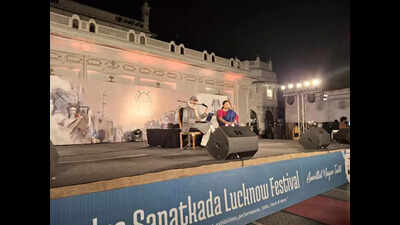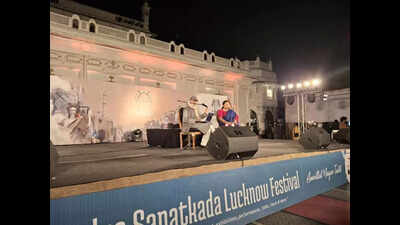- News
- Enticing tales of Lucknow’s famous lanes
Enticing tales of Lucknow’s famous lanes
Lucknow: Did you know that the historic lanes (galiyan) of Lucknow's old city have their own unique identity?
Most of these narrow streets are named after the profession or business that were once conducted in the congested lanes of the old city, reflecting the rich cultural and commercial heritage.
From Paan Wali Gali where betel leaves were sold, to Tambaku Wali Gali where tobacco sellers used to reside, to Bambe Wali Gali, where community tap was used to fetch water, to Warq Wali Gali where silver leave were made, each name tells a story of the trade and craftsmanship that once flourished in these congested yet vibrant streets.
A fascinating discussion took place on the changing landscape of Lucknow's streets, shedding light on the transformation of the city's names and professions at an event ‘Qisse Galiyon ke' during the 16th Mahindra Sanatkada Lucknow Festival held at Safed Baradari in Qaiserbagh on Tuesday.
"For instance, Chandi Wali Gali, once famous for its silverwork, now stands desolate. Similarly, Phool Wali Gali has turned into an ordinary street, while Choodi Wali Gali no longer sells bangles," Suhail informed.
The famous ‘Warq Wali Gali', where silver and gold leaves were made and the unique sound of a heavy wooden hammer continuously beating thick cloth or leather, have vanished, and the name of the lane also changed.
Suhail Hashmi emphasised, "There is a need to preserve cultural heritage and encourage the youth to reconnect with their roots."
Hashmi lamented, "It's unfortunate that the trend of changing names is being encouraged. The changing names will erase the rich cultural history of the lanes. Lucknow's culture is not just limited to its Ganga-Jamuni heritage but is enriched by contributions from all communities and social groups."
End of Article
FOLLOW US ON SOCIAL MEDIA
Visual Stories
Hot Picks
TOP TRENDING
Explore Every Corner
Across The Globe
Royal Rumble 2025 ControversyNBA Trade RumorParliament Budget SessionBudget Tax Rules for NRILamelo Ball
Delhi ElectionFox Reporter Erin AndrewRoyal Rumble 2025 Winners ListNew Tax Regime vs Old Tax RegimeCanada Bans US Firms











